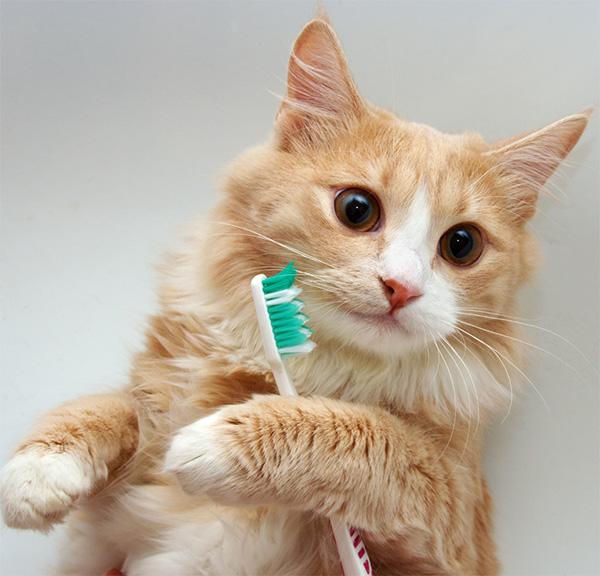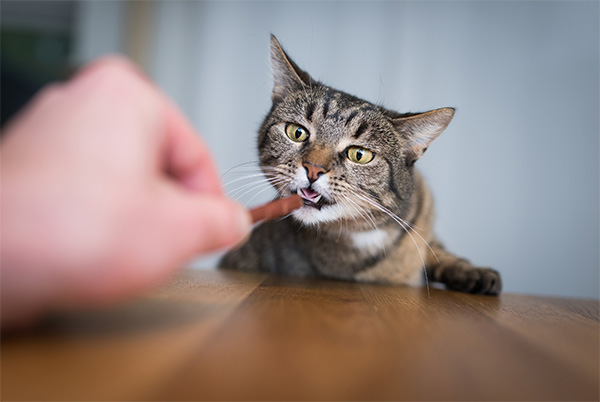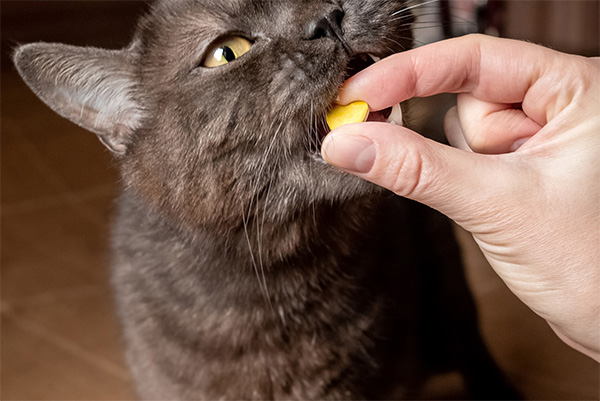Similar to humans, cats need consistent dental care to ensure their teeth and gums remain healthy. Neglecting a feline friend's oral hygiene can lead to significant health problems, such as painful gum disease, infections, and even systemic issues that affect vital organs like the kidneys or heart. Periodontal disease, caused by a buildup of plaque and tartar, is one of the most common dental diseases in cats, with many felines showing symptoms by the time they are 3 years old.
Proactive care, like brushing your cat’s teeth using a cat toothbrush and pet toothpaste, prevents periodontal disease. Brushing your cat's teeth regularly and scheduling professional dental cleanings will help maintain the health of their teeth and gums. Taking the time to gently brush your cat's teeth and encouraging them to accept tooth brushing ensures that their teeth will remain free of tartar, allowing them to live a longer life with fewer health problems.
How Often Should I Brush My Cat’s Teeth?
Veterinarians advise brushing your cat's teeth daily or at least 3-4 times a week. Consistent brushing helps eliminate plaque before it solidifies into tartar, which can cause periodontal disease. Plaque buildup and tartar accumulation irritate the cat's gums, leading to inflammation and dental disease if left untreated. To keep your cat's dental health, consider using a toothbrush designed for cats or a finger toothbrush paired with cat toothpaste or pet toothpaste. Creating a regular dental care routine is essential for avoiding dental issues.
Why Daily Brushing is Essential

Plaque forms on a cat’s teeth daily; if not removed, it can harden into tartar within 24-48 hours. Tartar irritates gum tissue and can lead to inflammation and infection, causing more serious dental problems such as periodontal disease. Daily brushing helps clean the outer surfaces and gum lines of your pet's teeth, preventing severe health problems and the need for costly professional dental cleaning by your veterinarian.
What If You Can’t Brush Daily?
If daily brushing of your cat's teeth is challenging, try to brush them at least 2 to 3 times a week. While daily dental care is ideal, brushing a few times a week can still help reduce plaque buildup and maintain your cat's oral health. As most cats become more accustomed to brushing their teeth and begin accepting the process, you can gradually increase the frequency, using positive reinforcement like treats to make the experience pleasant for both you and your cat. Whether you use a soft toothbrush or gauze wrapped around a cotton swab, brushing regularly is key to ensuring your cat's dental health and preventing serious dental issues.
Effects of Not Brushing Regularly
Failing to brush your cat’s teeth regularly can lead to several serious dental diseases. Without frequent tooth brushing, plaque buildup quickly turns into tartar, accumulating along the gum line and causing gingivitis. Early symptoms include bad breath, inflamed gums, and discomfort. If left untreated, these conditions may progress into periodontal disease, leading to painful infections, tooth loss, and long-term health problems affecting your feline friend's overall oral health. Consistent brushing is crucial for preventing periodontal disease and ensuring your cat's dental health.
Alternatives to Brushing for Difficult Cats

Brushing your cat’s teeth is one of the best ways to maintain their oral health, but if your cat doesn’t tolerate toothbrushing or you’re looking for other ways to care for their teeth, there are several alternatives. These methods can help reduce plaque and tartar buildup and maintain healthy gums. Here are some helpful alternatives to brushing your cat's teeth:
Dental Treats
Dental treats are specially formulated to clean a cat's teeth as they chew. With a textured surface, these treats effectively scrub the teeth to eliminate plaque and tartar. Many also include ingredients that promote fresher breath and contribute to gum health. Always look for treats that have the VOHC (Veterinary Oral Health Council) seal of approval, which indicates they meet the standards for reducing plaque and tartar.
Dental Chews and Toys
Dental chews and toys offer an additional effective method for enhancing oral hygiene in cats. These products are made from materials that help scrape off plaque and tartar as the cat chews on them. Some toys are infused with catnip or other flavors to encourage your cat to chew and play. Like dental treats, dental chews, and toys help stimulate the gums, reduce tartar, and keep teeth cleaner without the need for brushing.
Dental Gels and Water Additives
Dental gels and water additives can help improve your cat’s oral health by reducing bacteria in their mouth and slowing the buildup of plaque. Dental gels are applied to the gums and teeth, where they work by releasing enzymes that fight bacteria. These gels don’t require scrubbing or brushing and can be applied easily using a finger or applicator. Water additives are added to your cat's drinking water and have ingredients that help decrease plaque buildup and freshen their breath. Both options are convenient for cats that resist brushing.
Raw Bones (Raw Meaty Bones)
Some veterinarians and pet owners recommend giving raw meaty bones as a natural way to clean a cat's teeth. Chewing on raw bones helps scrape away tartar and plaque buildup while also providing essential nutrients. It’s crucial to use raw bones since cooked bones can splinter, leading to choking hazards or digestive issues. Always consult your veterinarian before giving raw bones to your cat to ensure they are safe and suitable.
Prescription Dental Diets
Certain cat foods are specially designed to promote dental health. These prescription dental diets are designed with a larger kibble size or special texture that requires more chewing, which helps scrape plaque from your cat’s teeth. These diets also contain ingredients that prevent plaque and tartar from hardening, keeping the teeth cleaner over time. If your cat is susceptible to dental issues, your veterinarian may suggest transitioning to one of these specialized diets.
Chewable Dental Supplements

Chewable dental supplements are another option for promoting oral hygiene in cats. These supplements are often available as flavored tablets or soft chews that cats find palatable. They function by dissolving plaque and tartar while also refreshing breath. Like dental treats, they are a convenient way to maintain your cat’s dental health if brushing isn’t an option. Look for supplements with ingredients like enzymes, chlorophyll, or other natural compounds that target plaque.
Wipes and Finger Brushes
Dental wipes or finger brushes can be a gentler alternative for cats that resist traditional toothbrushing. Dental wipes are soft, pre-moistened pads that you can use to gently rub your cat’s teeth and gums, removing food debris and some plaque buildup. Finger brush is a rubbery tool that fits over your finger, allowing you to gently clean your cat’s teeth without using a full toothbrush. Both methods are less invasive than regular brushing and may be more tolerable for some cats.
Regular Veterinary Dental Cleanings
Professional dental cleanings performed by your veterinarian are crucial for cats with significant tartar buildup or gum disease. These cleanings are done under anesthesia and allow the vet to thoroughly clean and examine your cat’s teeth, including areas that are difficult to reach with home care methods. While this is not an alternative for daily dental care, it is an important complement to other home-care methods and ensures your cat’s teeth stay healthy long-term.
Oral Sprays
Oral sprays provide an alternative method for minimizing plaque buildup and refreshing breath. These sprays are applied directly into your cat’s mouth, typically on the gums and teeth. They work by killing bacteria and reducing plaque formation. Oral sprays are convenient and easy to use, especially for cats that are resistant to more hands-on dental care methods like brushing or gels.
Healthy Diet
Providing your cat with a nutritious diet can contribute to better oral health. Dry kibble can be better than wet food for keeping teeth cleaner because it requires more chewing, which helps scrape off plaque. Moreover, specialized dental diets are designed to assist in managing plaque and tartar buildup. Feeding a balanced, nutritious diet also supports overall health, which can contribute to healthier teeth and gums.
When to Start Brushing Your Cat’s Teeth
The best time to begin brushing your cat's teeth is during their kitten stage. Introducing tooth brushing early helps your feline friend familiarize themselves with the process, making it easier to maintain their dental health as they age. By getting them used to a cat toothbrush and pet toothpaste early on, you can ensure their cat's dental health remains strong. However, it’s never too late to start. Even older cats' teeth can benefit from regular brushing teeth sessions, though they might require more patience and training.
To help your cat acclimate to brushing, begin gradually. Begin by touching your cat’s lips and introducing a toothbrush and pet toothpaste. Steer clear of human toothpaste, as it can harm your cat's health. Instead, consider using a finger toothbrush to clean their teeth gently and the outer surfaces. Positive reinforcement, such as treats or a bit of tuna water, can make the process more enjoyable for you and your cat. Keep initial sessions short—just a few seconds—to build trust and familiarity with the entire process.
